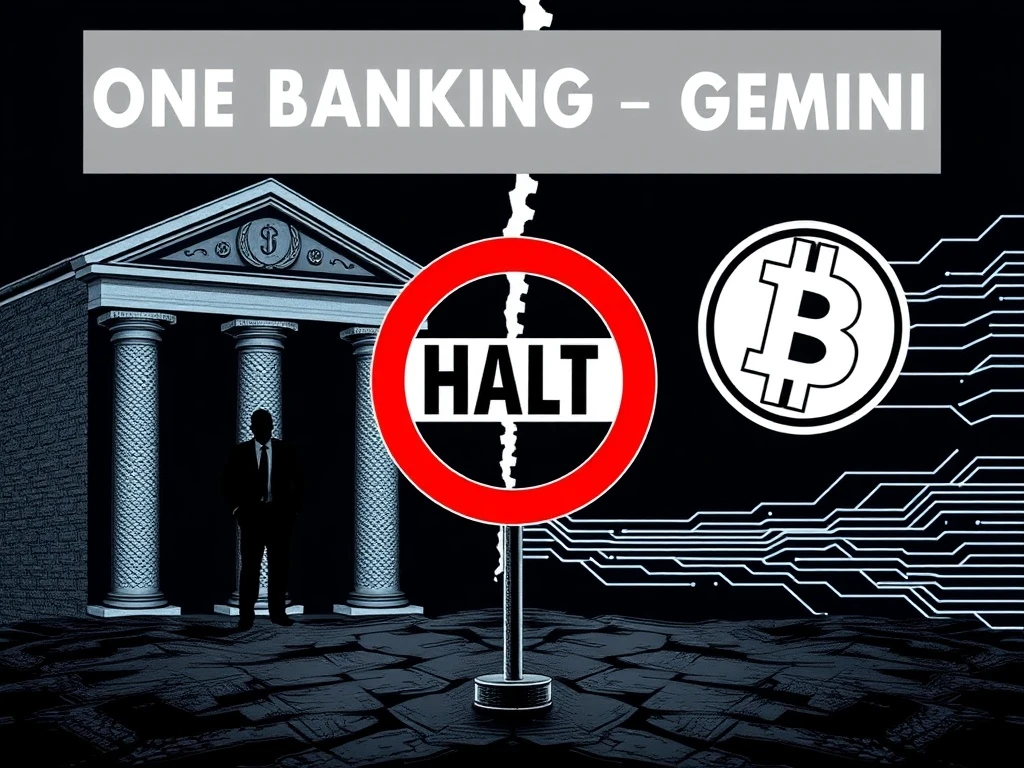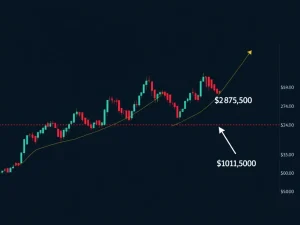JPMorgan’s Shockwave: Gemini Onboarding Halted Amid Open Banking Dispute

In a move sending ripples across the financial world, banking titan JPMorgan Chase has unexpectedly paused the re-onboarding of cryptocurrency exchange Gemini. This pivotal decision stems from an escalating Open Banking Dispute with Gemini co-founder Tyler Winklevoss, igniting fresh concerns about the future of financial data access and the ongoing integration of digital assets into mainstream finance. For anyone invested in the intersection of traditional banking and the rapidly evolving crypto landscape, this development is not just news; it’s a critical barometer of the challenges facing Fintech Innovation and the very ethos of open access in the digital economy.
JPMorgan Gemini Clash: The Open Banking Battle Begins
The core of this high-stakes standoff lies in JPMorgan’s proposed data-fee policies, which Tyler Winklevoss vehemently argues are a retaliatory measure designed to stifle competition. Winklevoss took to social media, accusing the banking giant of using its leverage to penalize fintech platforms that facilitate consumer access to their own banking data. He asserts that JPMorgan’s actions directly undermine the spirit and intent of open banking initiatives, which aim to empower consumers by allowing them to share their financial information securely with third-party services. This includes vital connections between users and crypto platforms, often facilitated by companies like Plaid.
The controversy spotlights JPMorgan’s stance on the Consumer Financial Protection Bureau’s (CFPB) Open Banking Rule, specifically Section 1033. This rule is designed to give consumers greater control over their financial data, enabling them to share it freely and securely with services they choose. By allegedly imposing “exorbitant fees” on data-sharing services, Winklevoss claims JPMorgan is attempting to erect barriers that would restrict access to essential financial infrastructure, effectively protecting its legacy business models from disruptive newcomers. This JPMorgan Gemini dispute is more than just a business disagreement; it’s a clash of philosophies over who controls consumer data and how financial services should evolve.
Winklevoss’s Accusation: Is This Crypto De-banking?
The most striking accusation from Tyler Winklevoss is that JPMorgan’s decision constitutes a form of “Crypto De-banking.” This term refers to the practice by traditional financial institutions of restricting or terminating banking services for cryptocurrency businesses, often citing compliance or risk mitigation concerns. While banks argue these measures are necessary to combat money laundering and other illicit activities, crypto advocates view them as tactics to suppress competition and innovation.
Winklevoss explicitly stated, “This week, JPMorgan told us that because of [my tweet], they were pausing their re-onboarding of @Gemini as a customer.” This direct link between his public criticism and the bank’s action suggests a punitive response, raising alarms about the freedom of speech and fair market access within the financial sector. The historical context of initiatives like Operation Choke Point 2.0, which previously targeted crypto businesses with similar restrictions, adds weight to Winklevoss’s concerns. This historical precedent fuels the fear that the current situation is not an isolated incident but part of a broader strategy to limit the growth and reach of decentralized technologies.
If true, this alleged Crypto De-banking by a major financial player like JPMorgan could set a dangerous precedent, making it harder for legitimate crypto firms to access the banking services necessary for their operations. This directly impacts fiat on-ramps and off-ramps, which are crucial for users to convert traditional currencies into cryptocurrencies like Bitcoin (BTC) and Ethereum (ETH) and vice versa.
Unpacking the Open Banking Dispute: CFPB and Data Fees
The heart of the matter is the Open Banking Dispute itself. The CFPB’s Section 1033 aims to foster a more competitive and innovative financial ecosystem by mandating that financial institutions make consumer financial data available to third parties, with consumer consent. This rule is a cornerstone of modern Fintech Innovation, enabling a wide array of services from personal finance management apps to crypto exchanges that rely on seamless data transfer for account linking and transaction processing.
JPMorgan, like many traditional banks, argues that providing data access incurs costs and risks, justifying the imposition of fees. However, the scale and nature of these proposed fees are what sparked Winklevoss’s outrage. He argues that these “exorbitant fees” are not merely cost recovery but a deliberate attempt to make data sharing economically unfeasible for smaller fintechs and crypto platforms, thereby undermining the very purpose of open banking. This conflict highlights a fundamental tension:
- Traditional Banks: Prioritize control, risk mitigation, and revenue from existing data practices.
- Fintechs & Crypto: Advocate for open access, consumer empowerment, and fostering innovation through data portability.
The outcome of this dispute could significantly shape the landscape for Fintech Innovation. If large banks can effectively gatekeep data access through prohibitive fees, it could slow down the development of new, consumer-centric financial products and services, particularly in the crypto space where integration with traditional finance is often essential for user adoption.
The Ripple Effect: Impact on Gemini and the Wider Crypto Market
The immediate consequence of JPMorgan’s pause on Gemini’s re-onboarding could be substantial for the crypto exchange. Gemini, like other platforms, relies on robust banking relationships to facilitate fiat-to-crypto conversions and withdrawals for its U.S. users. A prolonged pause could:
- Disrupt Fiat Operations: Make it harder for users to deposit or withdraw USD, impacting liquidity and transaction settlements for cryptocurrencies such as Bitcoin and Ethereum.
- Reduce Liquidity: A lack of seamless fiat on/off-ramps can deter new users and reduce overall trading volume on the platform.
- Damage Reputation: Create uncertainty among users and potential partners regarding Gemini’s operational stability.
Beyond Gemini, this incident sends a chilling message across the entire crypto industry. It reignites fears of Crypto De-banking and highlights the fragility of the bridges between decentralized finance and traditional financial infrastructure. Industry observers have pointed to similar alleged pressures from other institutions, such as Deutsche Bank, to distance partners from crypto ventures, suggesting a broader pattern of gatekeeping.
Paradoxically, while this dispute unfolds, JPMorgan itself reported a staggering $60 billion in net capital inflows into digital assets year-to-date. This underscores a significant and growing institutional demand for crypto-related services, even as the bank engages in practices perceived as restrictive towards crypto firms. This dichotomy reveals the complex and often contradictory relationship between established financial institutions and the burgeoning digital asset economy.
Navigating the Future: Regulatory Oversight and Financial Infrastructure
The JPMorgan Gemini conflict serves as a stark reminder of the ongoing struggle between traditional financial safeguards and the disruptive potential of decentralized technologies. It brings to the forefront critical questions about regulatory oversight, particularly how rules like the CFPB’s Section 1033 are enforced and interpreted. Stricter, clearer oversight that genuinely promotes open access could foster a more equitable environment for crypto projects and Fintech Innovation.
Conversely, inaction or a failure to enforce open banking principles risks entrenching the dominance of legacy institutions, potentially stifling the open-access ethos central to the crypto sector’s growth. For crypto advocates, this incident is a powerful example of the “de-banking” tactics they fear most – restricting access to essential infrastructure that can cripple even well-established crypto businesses.
The outcome of this particular dispute, and similar ones, will undoubtedly influence global approaches to integrating digital assets into traditional financial systems. As regulatory debates intensify worldwide, JPMorgan’s decision to pause Gemini’s onboarding remains a focal point in the evolving clash between established banking norms and the transformative forces reshaping global finance.
Summary: A Defining Moment for Open Finance
The halt in JPMorgan Gemini onboarding, triggered by a heated Open Banking Dispute with Tyler Winklevoss, is more than just a corporate spat. It’s a significant moment that underscores the deep-seated tensions between traditional finance and the crypto world. This alleged act of Crypto De-banking threatens the very spirit of Fintech Innovation and the promise of open banking. As the financial industry continues its complex dance with digital assets, how this dispute resolves will be a crucial indicator of whether a truly open and integrated financial future is achievable, or if legacy gatekeepers will continue to control the flow of innovation.
Frequently Asked Questions (FAQs)
1. Why did JPMorgan halt Gemini’s onboarding?
JPMorgan paused Gemini’s re-onboarding following public criticism from Gemini co-founder Tyler Winklevoss regarding JPMorgan’s proposed data-fee policies for fintech platforms. Winklevoss accused the bank of retaliating against his opposition to these fees, which he believes undermine open banking.
2. What is the ‘Open Banking Dispute’ about?
The dispute centers on JPMorgan’s stance towards the Consumer Financial Protection Bureau’s (CFPB) Open Banking Rule (Section 1033). This rule allows consumers to share their financial data with third-party services. Winklevoss alleges that JPMorgan plans to impose “exorbitant fees” on these data-sharing services, effectively restricting access and stifling competition and fintech innovation.
3. What does ‘Crypto De-banking’ mean in this context?
‘Crypto De-banking’ refers to traditional financial institutions restricting or terminating banking services for cryptocurrency businesses. Tyler Winklevoss claims JPMorgan’s action is an attempt to suppress competition and innovation in the crypto sector by limiting access to essential financial infrastructure, reminiscent of past initiatives like Operation Choke Point 2.0.
4. How might this situation impact Gemini users and the broader crypto market?
If the pause persists, it could disrupt fiat conversion processes for cryptocurrencies like Bitcoin and Ethereum on Gemini, potentially affecting liquidity and transaction settlements for U.S. users. For the broader crypto market, it highlights the ongoing challenges of integrating with traditional finance and raises concerns about potential gatekeeping tactics by large banks.
5. What is the role of the CFPB’s Section 1033 in this dispute?
CFPB’s Section 1033 is the Open Banking Rule that mandates financial institutions to make consumer financial data available to third parties with consent. This rule is crucial for fostering competition and innovation in fintech. The dispute raises questions about how effectively this rule will be enforced to prevent traditional banks from stifling new services through prohibitive fees.
6. What is JPMorgan’s stated position on digital assets amid this dispute?
While JPMorgan has not directly commented on Winklevoss’s specific allegations, the bank has publicly emphasized its commitment to compliance frameworks to mitigate risks. Interestingly, JPMorgan also reported $60 billion in net capital inflows into digital assets year-to-date, underscoring its own engagement with and institutional demand for crypto-related services, even as this dispute unfolds.









